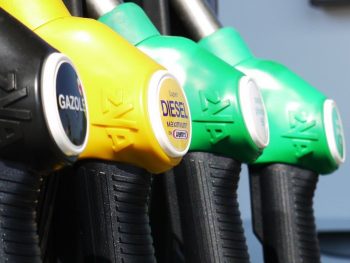Cautions and controversy over possible fuel duty rise
Drivers may need to brace themselves for a possible fuel duty rise in tomorrow’s Budget, with concerns mounting that new chancellor Rishi Sunak may axe the near decade-long freeze.
At a time of rising eco concerns and government plans to axe petrol, diesel and hybrid car and van sales within 15 years, ending the fuel duty freeze is move that would have palpable benefits when it comes to climate change. Figures from bus and coach travel campaign group Greener Journeys set out that the freeze since 2011 has caused an extra five million tonnes of greenhouse gas emissions by encouraging people to abandon public transport in favour of their cars.
The group also says the freeze has led to 5% more traffic, 250 million fewer bus journeys, 75 million fewer rail journeys and an extra 15,000 tonnes of NOx emissions on top of the extra five million tonnes of CO2.
And with the fuel duty freeze estimated to have cost the Treasury more than £50bn in revenue foregone, Greener Journeys persuasively adds that ending the freeze would raise enough revenue over current Parliament to treble NHS budget for doctors and nurses for one year.
Claire Haigh, chief executive of Greener Journeys, said: “Ending the freeze in fuel duty would send a clear signal around the world that the UK is serious about meeting its net zero target.
“Ending the fuel duty freeze would also raise urgently needed revenue at a time when the UK is struggling with the coronavirus, impacts of flooding across the country and its ‘levelling up’ agenda. By nudging people to switch some of their car journeys to bus or train, ending the freeze would also support the public transport networks that are so vital for improving life chances for everyone in society.”
It’s a move that would obviously prove unpopular with drivers; RAC research finds just one in 10 (10%) are in favour of an increase.
However, drivers on the whole would prefer duty be kept at the current level, rather than be reduced, if a proportion of it were reserved for fixing potholes and improving the quality of roads that are under local councils’ control.
In fact, six in 10 drivers (59%) want the new chancellor to bolster spending on the country’s crumbling local road infrastructure tomorrow’s Budget by ringfencing 2p from every litre of petrol and diesel sold without increasing duty rates, according to an RAC survey of 3,200 drivers. That compares to 26% of respondents who want to see fuel duty reduced.
RAC head of policy Nicholas Lyes said: “We believe the only hope for getting the UK’s local roads up to a standard fit for the 21st century is by ring-fencing a small proportion of the tax drivers already have to pay every time they fill up.”
Meanwhile a group of MPs including ex-cabinet ministers Iain Duncan Smith, David Davis and Chris Grayling has warned of the impact of a fuel duty rise on working people who “depend on their cars, vans and lorries to get about and run a small business”.
And the Freight Transport Association (FTA) has previously said a change to fuel duty “would cause damage to the economy while not assisting government plans to transition the UK to a low-emission economy.
Christopher Snelling, head of UK policy at FTA, said: “Rising fuel costs are already threatening the UK’s future business prospects, and as we enter into the post-Brexit period, and with many businesses already facing challenging economic conditions, any tax increase would stoke inflation, add to business costs and threaten the livelihoods of small businesses working with HGVs and vans.
“This year, small businesses will be forced to upgrade their fleets early to meet the Government’s Clean Air Zone requirements, at their own cost. To penalise them at the same time via a fuel duty increase would be deeply unfair, and unsustainable for many businesses.”
However, chartered accountants MHA MacIntyre Hudson have said an increase in fuel duty may be necessary as part of a package of tax rises and targeted reliefs to support low-emission and electric vehicles.
Nigel Morris, tax director, said: “Unfreezing fuel duty will be unpopular but it is probably the best way to pave the way to a zero carbon future for the motor sector. An increase in fuel duty for conventional internal combustion engine (ICE) vehicles of 2p per litre could raise £4bn over the next five years, whereas a continued freeze on fuel duty could ‘cost’ the Treasury £1bn per annum.
“This could pay for the infrastructure to support a large increase in new Ultra Low Emission Vehicles (ULEVs) and Battery Electric Vehicles (BEVs). However, a tax hike alone is not enough; it needs to be supported by targeted tax incentives.
“Two key tax incentives that could facilitate this are firstly the Plug-in Car Grant (PICG), which should be maintained until 2025, at least in some form. Secondly, the sector needs certainty on the future of Benefit-in-Kind (BIK) rates. The change in the BIK rates coming in this April make it significantly cheaper to run an ultra-low emissions vehicle, but the more certainty there is that these will be maintained the better.
“In addition, the Government needs to address the infrastructure issue and bring together the currently fragmented and unreliable ‘series’ of charging networks and providers. Incentives for charging infrastructure providers to work together to achieve true interconnectivity must be considered.
“These measures would keep the list price of ULEVs and BEVs lower. Coupled with certainty on the BiK position, they would encourage the earlier uptake of ULEVs, particularly in fleets, and help the Government meet its CO2 targets.”













